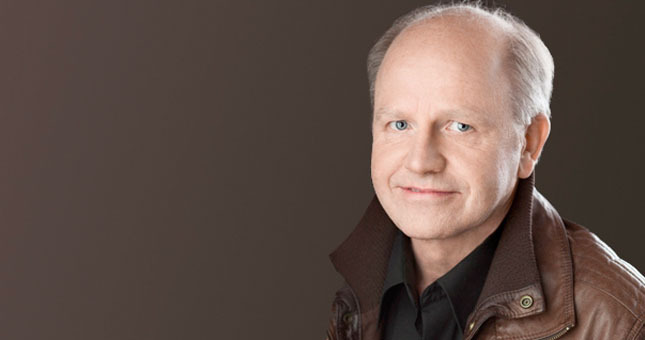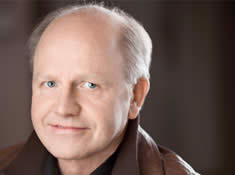
Words Becoming Flesh
Thoughts on Theatre and Faith with Ron Reed
Ron Reed is Artistic Director of Pacific Theatre located in Vancouver, British Columbia. He also co-teaches the Vocation of the Artist course at Regent College with Dr. Iwan Russell-Jones. Learn more about Pacific Theatre and buy tickets for their current season at pacifictheatre.org
TB: Could you introduce yourself quickly: who you are, what you do, and what's your connection to Regent College?
RR: I'm Ron Reed and I'm the artistic director of Pacific Theatre. I came to Regent in 1978 when I finished my undergraduate degree in Alberta. I loved Alberta but I wanted to do a new thing, and I've always loved the coast. I also wanted to learn New Testament Greek and my roommate told me, "You can learn New Testament Greek in the summer in Vancouver." So it was everything I dreamed of. I came out here and did Summer School, got invited to stay and work in a church, continued taking Regent courses over the next four years, and it slowly added up to a diploma.
TB: That's quite a journey from coming to Regent to learn Greek to now being the artistic director of Pacific Theatre. How did Regent College affect your vocational trajectory?
RR: I had already done some theatre school before setting that aside to head for ministry, and indeed, it was at Regent where I recovered a real sense of calling to do theatre and be an actor. By 1981, I was taking nearly full-time studies and testing out whether I should do ministry or theatre. In the course of that year, I decided theatre was the thing. In fact, I discussed this with Dr. James Houston at Regent (and most people of my generation have a Dr. Houston vocation story). I told him the two things I was interested in and he asked, "Are you a good pastor?" I said, "Yeah," and he asked, "Are you a good actor?" I said, "Yeah," and he said, "Well then, be an actor, because there aren't too many Christians who do that, and there are lots who do the pastor thing." The advice itself was great, but maybe more deeply impacting was his matter-of-factness; there was no question that a Christian vocation could be either of those options.
TB: How do you explain what you do as being part of your faith and calling?
RR: It would be fair to say that I wouldn’t have had to do Pacific Theatre to be called to be an actor. I could very well be doing plays at other theatres and be called by God to do that. Just because Pacific Theatre shows go further in exploring spiritual experience doesn’t make the calling more Christian. I feel that the calling to be an actor shouldn’t even need explaining. If that’s how you’re built, did God mess up by making you love theatre, or painting, or photography, or writing stories? I don’t think so. I truly believe that whatever is done in the world that has value to our culture and humanity is a place where God would like us to be living our faith.
At Pacific Theatre, we quickly left behind the label “Christian” theatre because “Christian” is so problematic as an adjective. But I never deny that I am a noun: a Christian. The work we do is always connected with my life of faith and our life of faith as a company, though not every person that works at Pacific Theatre is a believer. There is, however, a very clear mandate and intention.
I remember one of the first plays we ever did was Cotton Patch Gospel. It takes the story of Jesus and puts it in modern Georgia with bluegrass music, the Ku Klux Klan, the governors, the Bring Back the Bible Society Convention, and all that. I talked to a local actress the following summer who said she and her friend had seen the play and loved it because it was funny and well done. She recalled that during a certain point in the play, one of them had leaned over to the other and said, “They really mean it.” The woman told me the play was so great because it wasn’t merely entertainment. We were telling the story with conviction, and isn’t that what makes any play work? People pay money to see conviction and passion, energy and fierceness. People make theatre about what’s most important to them. As Christians, we do too.
TB: What do you think theatre does for culture that perhaps other art forms can’t do?
RR: There’s a fundamental craving in human beings for stories, and that is fundamentally what theatre is. We can ask among the story arts, “Why live theatre as opposed to movies or television?” In today’s culture, you can watch anything on your handheld device or computer. You cannot watch theatre on your iPod or any two-dimensional screen. People will say, “Why don’t you videotape your plays?” Because it’s just not the same. Same thing goes for “Why don’t you do church on TV?” That experiment’s been tried and, in my opinion, mostly failed. What a sad, small version of the gospel we have when it is reflected on a two-dimensional TV where you never meet anybody and don’t know anyone; what a bizarre manifestation. Compare that with Jesus walking around Galilee with his disciples—so incarnated, so physical, and so relational.
So why live theatre as opposed to some of these other stories? Live theatre has the unique quality of being right there in the room with you. The characters are literally breathing the same air as you are, and Pacific Theatre is an intimate theatre. Not only are the people right there, but at Pacific Theatre, they’re very good actors. When you’ve got people with an almost supernatural gift acting-wise, and they’ve worked together for however many weeks shaping this play that took somebody years to write, the concentration of gifts and energy is overwhelming. To sit in a room with a hundred other people and to have this served up, I don’t think anything else compares.
TB: Talk a little about the importance of real people enacting story for a live audience. Is there any way in which your faith informs your understanding of what’s going on in that space?
RR: Yes, a big way is incarnation. It’s not a coincidence that in theatre, you take the words on a script and you enflesh them—you live them out. If that doesn’t sound familiar to people, they haven’t read their New Testament lately. “The Word became flesh and made his dwelling among us.” [John 1:14] God wouldn’t have done that if it wasn’t the best way, and there’s an echo of that in my craft. I love that. But story itself, even the kind of story that’s not incarnated—like in novels—I think there’s something extraordinary about that too, something deeply Christian, although it’s not exclusive to Christianity.
American playwright David Mamet says that when you tell a story well, it does things at the fundamental levels of our soul, our thinking, our ethics, and our spirit. Story is not just a rambling yarn—it’s cause and effect. It’s choice, action, and consequence. Mamet says when you build this story well and where the characters are fighting for what they deeply crave, there is something being patterned in our imagination. We are demonstrating a world where choices that result in actions have consequences, where you have to take certain risks to change things, and that things are worth changing. At the core of story is what somebody craves, needs, or is fighting for, and the desires of our hearts are revealed in actions and choices. In this way, there is something deeply Christian, deeply spiritual, or deeply ethical in any well-told story. Look at the Old Testament where God’s always saying, “Tell the story, tell your children the story. Remember what happened here, remember what I did for you.” Sometimes it’s explicit and other times you’re left asking, “What did that mean exactly?” Everyone needs story and we’re always trying to find the story in our lives. If we didn’t, we’d probably drift along in a meaningless kind of miasma.
Another thing that theatre does a remarkable job with is letting you identify with somebody who may not be like you. At the end of the play, you step back and some of your opinions about people may have shifted because you lived in their skin for two hours and maybe cheered them on with some of the decisions they made, saw how they got there, and how it must feel to be them, if nothing else. Theatre humanizes us.
TB: You come at story as an actor and director, but you also have experience as a playwright. What have you learned from that experience?
RR: An extraordinary experience as a playwright is that you concoct this world in your head. You’re writing at two in the morning and you hear these voices fighting about something or falling in love, and you sit there and you type it down. Then one day, you sit in an audience and watch human beings who have embodied the people that you made up in your head. It is an intimate, emotional experience that’s unparalleled. I feel like I get a little taste of what it is to be God. I know that sounds dangerous, but I mean it in the humblest of all ways. You sit there and the love you feel for your creation and the actors playing your characters is overwhelming. For me, the whole craft of acting and certainly playwriting means I not only live out my creatureliness—who I was made to be—but I actually taste what it is to be a creator, a maker in the image of the one who made me and all creation and the drama of all history. It’s only a little taste, but oh my goodness, it’s extraordinary.





